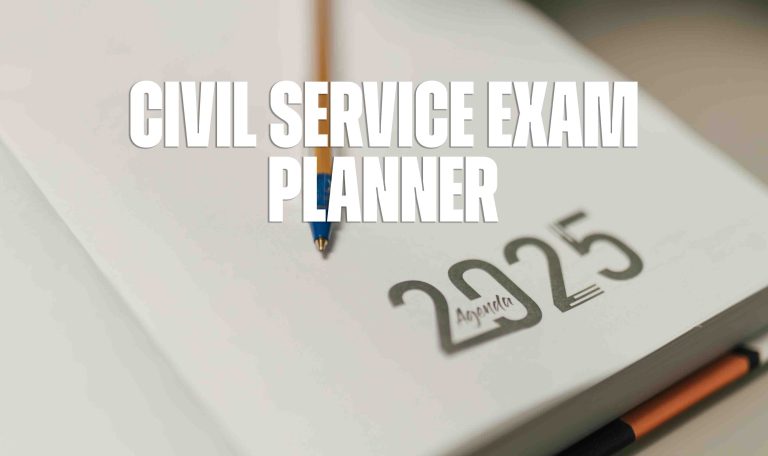- Understand the Exam Format: The Civil Service Exam in the Philippines usually consists of two parts – the Professional Level Exam and the Sub-professional Level Exam. The exam format may include multiple-choice questions (MCQs), essay writing, and/or situational judgment tests. Familiarize yourself with the structure to know what to expect.
- Review the Syllabus: The Civil Service Commission (CSC) provides an official exam syllabus that outlines the topics to be covered. The syllabus can be accessed through the CSC website or official publications. Pay attention to each subject’s weightage and focus on the areas with higher marks allocation.
- Create a Study Plan: A well-organized study plan is essential to cover all the subjects thoroughly. Set achievable goals and allocate specific study hours for each subject. Balance your time effectively, considering your strengths and weaknesses.
- Use Reliable Study Materials: Invest in reputable review books, study guides, and online resources that align with the exam syllabus. You can find recommended reading materials on the CSC website or seek advice from individuals who have already taken the exam.
- Practice with Past Papers: Access previous exam papers and practice answering them within the time limit. Analyze your performance, identify the types of questions you struggle with, and work on improving in those areas.
- Take Practice Tests: To simulate real exam conditions, take practice tests regularly. This will help you build confidence, improve time management skills, and reduce anxiety during the actual exam.
- Work on Time Management: During the exam, time management is crucial. Learn to budget your time for each section based on the number of questions and allotted time. If you encounter a challenging question, move on to the next one and come back to it later if you have time.
- Focus on General Information: The Civil Service Exam often includes questions related to Philippine history, government structures, and laws. Review major historical events, the Constitution, branches of government, and significant legal principles.
- Improve English Proficiency: The exam may have language proficiency components, including grammar, vocabulary, and reading comprehension. Engage in regular reading, practice writing essays, and work on English language skills.
- Stay Updated: Current events play a crucial role in the exam, especially in the general information section. Follow reputable news sources, both local and international, to stay informed about social, economic, and political developments.
- Join Study Groups: Collaborating with peers in study groups can enhance your learning experience. Discussing topics, sharing insights, and explaining concepts to others can solidify your understanding.
- Take Care of Your Health: Exam preparation can be mentally taxing. Ensure you get enough sleep, eat a balanced diet, and engage in physical activities to keep your mind and body in top shape.
- Manage Stress: Preparing for the exam can be stressful, but don’t let it overwhelm you. Practice relaxation techniques, take breaks, and do activities that help you de-stress.
- Read and Analyze: Developing strong reading comprehension and analytical skills is essential for understanding complex questions and providing well-reasoned answers. Practice reading different types of texts and practice critical thinking.
- Stay Positive and Confident: Confidence is a key factor in exam success. Believe in yourself, trust your preparation, and stay positive throughout the exam.
Remember, the Philippines Civil Service Exam is designed to assess your knowledge, skills, and aptitude. By following these tips and dedicating yourself to focused and consistent preparation, you can increase your chances of passing the exam with flying colors. Good luck on your journey to becoming a civil servant!





0 comments